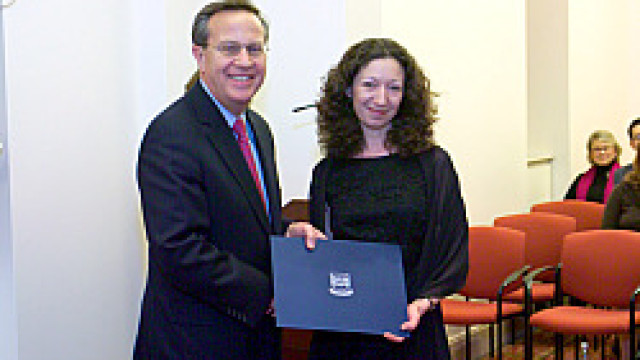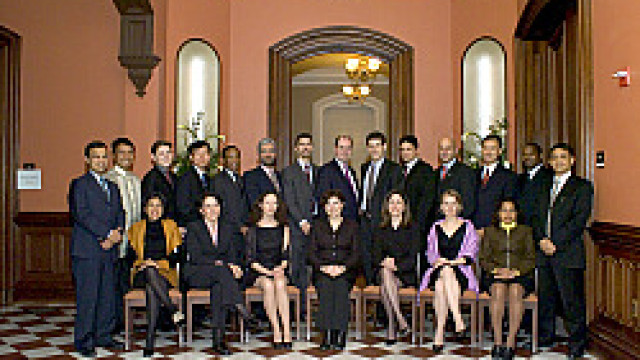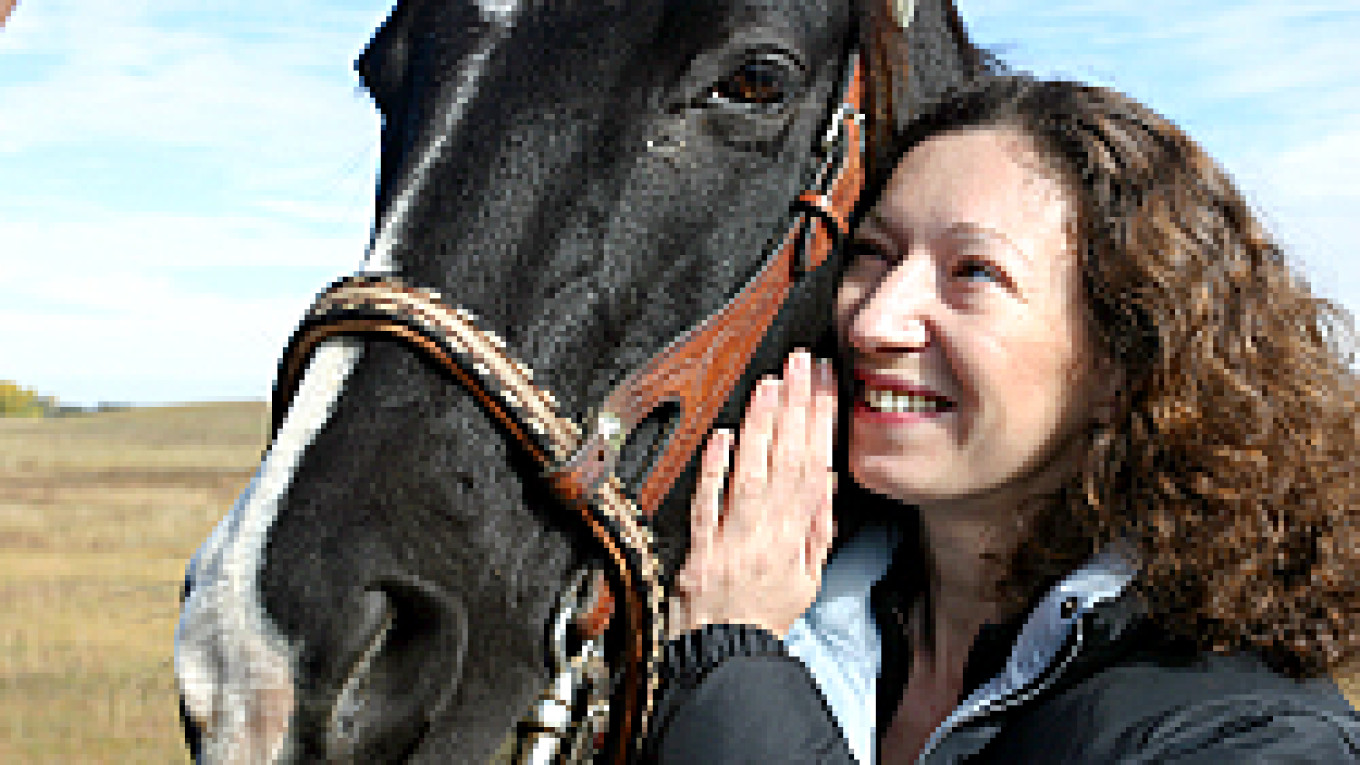At the top of her game, Karina Dashko is now the head of the corporate law and procedure department at international aluminum giant United Company RusAl. But her life was not always like this.
When the Soviet Union finally shuddered to a halt in the early 1990s, she felt that "my country didn't need me at all."
Dashko was three years out of university by the time of the collapse, placing her in author Viktor Pelevin's "Generation P" -- those who graduated from a Soviet education into a quasi-capitalist Russia.
But unlike many of her countrymen, Dashko had some advantages: her family, her education and her tenacity -- all of these helped her successfully transcend the gap between her generation and the coming generations.
Born in 1966, Dashko grew up in an academic family. During Soviet times her mother worked as a French interpreter. Her father was both a French and English interpreter and worked for the International Trade Union -- a job that had him traveling all over the world, an oddity in that period.
"I wasn't as isolated as most other people," Dashko said.
Her family was able to get foreign publications that were hard to obtain behind the Iron Curtain. At one point her house became a virtual underground movie theater when she was in her early 20s.
"I was one of the first among my friends to have a VCR," she said. It was a gift her father brought from a trip abroad.
"It was incredible. We only had about 10 movies, but for all of 1988 my friends would come over to the house with tapes that they had scrounged up somehow," she said, laughing.
A particular favorite was Oliver Stone's Vietnam epic, "Platoon."
"They were really hard to get at that time. We would watch anything," said Dashko.
"Her whole background works for her," said Igor Orlov, now a senior lawyer at Clyde and Co. and a good friend from Dashko's days at VimpelCom. "When you can see the world, see how other people live, it helps add up to who you are as a professional."
Entering university in 1984, Dashko unsurprisingly studied French and English linguistics and pedagogy at People's Friendship University.
But a degree in languages from such a university did not mean much by 1990.
"Businessmen needed secretaries with English, but I didn't want to do that," she said. "I need to create, invent, think."
Even with an upbringing in the intelligentsia, like many of her generation, Dashko had to be re-educated to deal with the new world.
In 1994 she entered Moscow State University to study law. She also worked with the State Duma to develop programs for disclosing corporate information and protecting minority shareholders, and helped draft plans for the Russian security exchange regulatory body.
Dashko also served as a legal consultant to the International Finance Corporation. There she promoted sustainable investment in the private sector of developing countries.
Then, in 1998, the economy collapsed.
"One day I was making $2,000 a month, and I came in the next day and they were asking us to take 2,000 rubles a month. I just couldn't stay," she said.
Soon she found work with Coudert Brothers, an international law firm. From this experience, in 2000 she was able to enter the New York University School of Law's yearlong Masters of Law program.
For much of her time in the city she lived on Union Square, the city's quintessential urban meeting place.
"You just have this immediate feeling of freedom living in New York City," Dashko said.
Yet even after graduating, her problems did not end. Older than the other students, she had a hard time getting picked up as an intern in the city -- the common route for international students, who then usually go home and continue working for the same firm there.
"I was tired of having to struggle for everything [in Russia]. In the U.S. you have the right to choose the path of your life. In Russia you are obliged to do this and that because you need to survive," she said.
However, she remained frustrated in her search for a position in the United States.
In 2002 she returned to Russia and began working for VimpelCom, where she remained until 2006.
"They have a Western work ethic and corporate culture," she said.
Dashko worked there as the head of the corporate law department, secretary of the board and chief compliance officer.
During her time at VimpelCom, she was accepted into the Yale World Fellows Program, where she studied for six months in 2004 with other leading business minds from all over the world.
But by 2006 it was time to move on.
On her return, she began working for RusAl, right before the aluminum giant's merger with SUAL and Glencore last year.
"I'm finally creating," she said of her work at United Company RusAl. "I'm creating the ways, the rules, that govern how people interact in the company and with the company."
For others to be successful in Russia they must "have an open mind about everything and look for opportunity everywhere," she said.
Dashko is, for the time being, happy.
"You think one thing, then life gives you these different opportunities," she said.
When the Soviet Union finally shuddered to a halt in the early 1990s, she felt that "my country didn't need me at all."
Dashko was three years out of university by the time of the collapse, placing her in author Viktor Pelevin's "Generation P" -- those who graduated from a Soviet education into a quasi-capitalist Russia.
But unlike many of her countrymen, Dashko had some advantages: her family, her education and her tenacity -- all of these helped her successfully transcend the gap between her generation and the coming generations.
Born in 1966, Dashko grew up in an academic family. During Soviet times her mother worked as a French interpreter. Her father was both a French and English interpreter and worked for the International Trade Union -- a job that had him traveling all over the world, an oddity in that period.
"I wasn't as isolated as most other people," Dashko said.
Her family was able to get foreign publications that were hard to obtain behind the Iron Curtain. At one point her house became a virtual underground movie theater when she was in her early 20s.
"I was one of the first among my friends to have a VCR," she said. It was a gift her father brought from a trip abroad.
 Karina Dashko Dashko receiving her diploma from the Yale World Fellows Program in 2004. | |
A particular favorite was Oliver Stone's Vietnam epic, "Platoon."
"They were really hard to get at that time. We would watch anything," said Dashko.
"Her whole background works for her," said Igor Orlov, now a senior lawyer at Clyde and Co. and a good friend from Dashko's days at VimpelCom. "When you can see the world, see how other people live, it helps add up to who you are as a professional."
Entering university in 1984, Dashko unsurprisingly studied French and English linguistics and pedagogy at People's Friendship University.
But a degree in languages from such a university did not mean much by 1990.
"Businessmen needed secretaries with English, but I didn't want to do that," she said. "I need to create, invent, think."
Even with an upbringing in the intelligentsia, like many of her generation, Dashko had to be re-educated to deal with the new world.
In 1994 she entered Moscow State University to study law. She also worked with the State Duma to develop programs for disclosing corporate information and protecting minority shareholders, and helped draft plans for the Russian security exchange regulatory body.
Dashko also served as a legal consultant to the International Finance Corporation. There she promoted sustainable investment in the private sector of developing countries.
Then, in 1998, the economy collapsed.
"One day I was making $2,000 a month, and I came in the next day and they were asking us to take 2,000 rubles a month. I just couldn't stay," she said.
Soon she found work with Coudert Brothers, an international law firm. From this experience, in 2000 she was able to enter the New York University School of Law's yearlong Masters of Law program.
For much of her time in the city she lived on Union Square, the city's quintessential urban meeting place.
 Karina Dashko Students from the Yale World Fellows Program were from more than 17 countries, including Dasko representing Russia. | |
Yet even after graduating, her problems did not end. Older than the other students, she had a hard time getting picked up as an intern in the city -- the common route for international students, who then usually go home and continue working for the same firm there.
"I was tired of having to struggle for everything [in Russia]. In the U.S. you have the right to choose the path of your life. In Russia you are obliged to do this and that because you need to survive," she said.
However, she remained frustrated in her search for a position in the United States.
In 2002 she returned to Russia and began working for VimpelCom, where she remained until 2006.
"They have a Western work ethic and corporate culture," she said.
Dashko worked there as the head of the corporate law department, secretary of the board and chief compliance officer.
During her time at VimpelCom, she was accepted into the Yale World Fellows Program, where she studied for six months in 2004 with other leading business minds from all over the world.
But by 2006 it was time to move on.
On her return, she began working for RusAl, right before the aluminum giant's merger with SUAL and Glencore last year.
"I'm finally creating," she said of her work at United Company RusAl. "I'm creating the ways, the rules, that govern how people interact in the company and with the company."
For others to be successful in Russia they must "have an open mind about everything and look for opportunity everywhere," she said.
Dashko is, for the time being, happy.
"You think one thing, then life gives you these different opportunities," she said.


